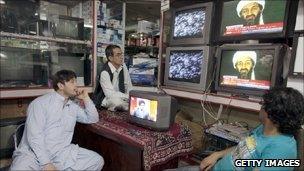Osama Bin Laden: What happened to his body?
- Published

Facial recognition technology and DNA tests are reported to have been used to identify the body
US officials say Osama Bin Laden's body was treated with respect and buried at sea, but some Muslims argue there was no good reason for not burying it on land.
Islamic tradition requires the dead to be buried as soon as possible, unless an autopsy is required.
The US military took this requirement very seriously, burying the body within hours.
"Traditional procedures for Islamic burial were followed," an official said.
Religious rites were carried out on the deck of a US aircraft carrier, the USS Carl Vinson. The body, shrouded in a white sheet and placed in a weighted bag, was then positioned on a flat board, tipped up, and eased into the Arabian Sea.
This occurred at 0600GMT, approximately 12 hours after the firefight during which Osama Bin Laden was shot in the head.
After this first shot, reports ABC News' The Blotter, external, he was shot again, to make sure that he was dead.
The body was then flown to Afghanistan and Bin Laden's identity was confirmed. Officials say a DNA sample was taken that matched that of several other family members. Some sources say facial recognition technology was also used.
From Afghanistan, the body was, it appears, flown to the USS Carl Vinson.
"A military officer read prepared religious remarks, which were translated into Arabic by a native speaker," a US defence official said.
Why at sea?
According to UK-based Imam Dr Abduljalil Sajid, Chairman of the Muslim Council for Religious & Racial Harmony, four key steps need to be followed:
Washing
Shrouding in white cloth
Ritual prayer
Burial
There is no necessity for an imam to be present, he says, but the procedures should be carried out by Muslims at least one of whom "knows the minimum basic Muslim law of burial".
Whether any such person was present is impossible to know, he says, based on the limited information provided. But he also questions whether sea burial was appropriate in this case.
It is correct to carry out a burial at sea when someone dies on a sea journey, he says, but in this case there was no sound reason for it.
The US authorities could surely have found someone - a member of the extensive Bin Laden family, or even one of the many supporters of his "evil" ideology - who would have been prepared to give the body a proper burial, he argues.
His words were echoed by Mohammed Qudah, a professor of Islamic law at the University of Jordan, who told the Associated Press news agency that burying Bin Laden at sea was not forbidden if there was nobody to receive the body and provide a Muslim burial.
But he went on: "It's neither true nor correct to claim that there was nobody in the Muslim world ready to receive Bin Laden's body."
The agency also quoted Dubai's grand mufti Mohammed al-Qubaisi, saying that sea burials were permissible only in extraordinary circumstances, adding: "This is not one of them."
"If the family does not want him, it's really simple in Islam: You dig up a grave anywhere, even on a remote island, you say the prayers and that's it," he said.
No location
US officials have given two reasons why a sea burial was chosen. First, that they did not want his grave to become a shrine. Second, that there was no time to negotiate with other countries to arrange a possible burial on land.
According to CBS News, Saudi Arabia refused to take the body, external. If correct, this suggests that an offer was made - and that had Saudi Arabia accepted the body, there would have been a grave, which could in theory have become a shrine.
However, ABC's Jonathan Karl, writing before the burial was confirmed, external, painted a different picture:
"US officials tell me the last thing they want is for his burial place to become a terrorist shrine.
"To avoid that, an informed source tells me, the intention is to bury his body at sea - leaving no definitive location for the final resting place of his body."